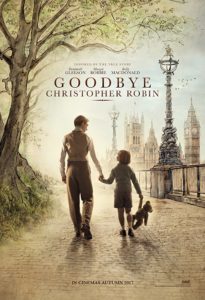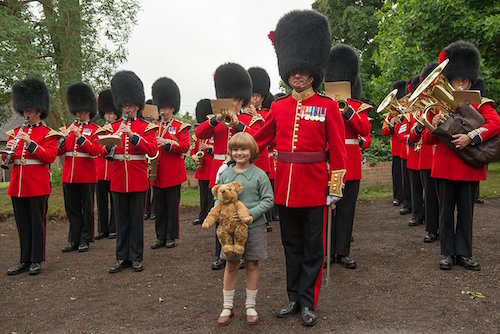This is not a children’s story about a child. It’s an adult story about a family. Goodbye Christopher Robin illuminates the rather gloomy profile of author A.A. Milne and his family—principally his son, Christopher Robin—and the inspiration behind Winnie the Pooh and its wild success.
 Whatever pre-conceived optimisms you have about this film, toss them out and refresh your expectations. This is not the snuggly-wuggly, starry-eyed portrayal you may have hoped for. Audiences expecting a partially animated, frolicsome romp will be largely disappointed when they find that their anticipated “hunny” pots and boisterous, bouncing tigers have been replaced with bits of adapted crude war footage and the minutiae of a writer-turned-veteran’s PTSD-induced depression.
Whatever pre-conceived optimisms you have about this film, toss them out and refresh your expectations. This is not the snuggly-wuggly, starry-eyed portrayal you may have hoped for. Audiences expecting a partially animated, frolicsome romp will be largely disappointed when they find that their anticipated “hunny” pots and boisterous, bouncing tigers have been replaced with bits of adapted crude war footage and the minutiae of a writer-turned-veteran’s PTSD-induced depression.
If you can get past that, then you’re in for a fairly satisfying ride, despite some meandering storylines. Though sad, it is a fascinating portrayal. Goodbye Christopher Robin explores the relationships between the real-life Christopher Robin AKA “Billy Moon” (breakout star Will Tilston); his father, notable dramatist A. A. Milne (Domhnall Gleeson); Christopher’s mother, Daphne (Margot Robbie); and his beloved nanny, Nou (Kelly Macdonald).
A. A. Milne has returned from WWI suffering from PTSD. A West-End playwright, Milne makes it known that he does not support future war efforts, and wishes to make the transition from playwright to book author by writing and publishing his anti-war/pro-peace ideals—but he can’t steady his brain enough to write in the city. Much to the dismay of his socialite wife (a role embraced by a pouty, yet much too perky Robbie), Milne moves his family to rural East Sussex, where he is finally able to quiet his anxiety in the countryside (the inspiration for Pooh’s Hundred Acre Woods).
It is here where Christopher Robin is first introduced to his now-famous teddy bear (originally named “Edward” the bear), who will soon become his greatest companion—for a while.
Up until now, the relationship between Christopher Robin and his parents is stilted. At best, they are strangers who live together, to whom he mustn’t speak unless spoken to first. Reared primarily by his doting nanny (an agreeable role that Macdonald embraces naturally and wholeheartedly), Christopher Robin eventually gets his chance at father-son bonding. They explore the forest as Christopher Robin’s imagination runs free. He, along with his teddy bear and crew of stuffed animal buddies (Tigger, Piglet, Eeyore, Kanga, and Roo), plays without a care in the world—putting on brightly imaginative but personal productions with his toys that end up being in the limelight.
The elder Milne soon realizes—with a nudge from Daphne—that the same joy this brings him during such a miserable time would also benefit the rest of the world. Unbeknownst to his son, he soon employs his offspring’s resourcefulness as research for what would soon become the world of Pooh. Milne’s friend and partner, Ernest (well played by Stephen Campbell Moore), illustrates the storybook alongside him. Robin later realizes that the magic he felt while bonding with his father was mostly just research.

Will Tilston in “Goodbye Christopher Robin.” Photo by David Appleby’s.
Milne penned Winnie-the-Pooh, published in 1926, closely followed by The House at Pooh Corner in 1928. The fictionalized Christopher Robin and Pooh were born then—paving the way for the real-life Robin to become one of the foremost child celebrities in the first half of the 1900s, as recorded media became increasingly prevalent. Unfortunately, this also marked the beginning of an extraordinarily challenging and destructive adolescence for the real-life Christopher Robin, whose peers completely shunned him due to his fame for many years.
Despite this being his debut, Tilston plays the adorably endearing, vulnerable young Christopher Robin with an easy, experienced finesse. Tilston is the true star of this film, though Gleeson, too, well embodies a soured man with a hardened exterior.
I enjoyed this movie and the magical tidbits it did offer—director Simon Curtis treats us to some sweetly dynamic scenes nestled into the dreariness. But there were some stumbles along the way. Is Goodbye Christopher Robin an author bio-pic? Is it a PTSD study? Is it a creative dossier on child celebrities? Or just a family film?
All of the above, really. Audiences will find themselves tilting their heads, wondering whether they came to see a post-war epic, a biography, or a cute film. And, despite the whimsy of Winnie the Pooh and the goodness at its heart, the inability of Goodbye Christopher Robin to firmly plant even one foot in a primary genre almost makes it a cumbersome journey. Almost.

| Producer: | Steve Christian, Damian Jones |
| Release Date: | October 27, 2017 |
| Starring: | Domhnall Gleeson, Margot Robbie, Kelly Macdonald, Will Tilston, Alex Lawther, Stephen Campbell Moore |
| Writer: | Frank Cottrell Boyce, Simon Vaughan |
| MPAA Rating: | PG |
| Director: | Simon Curtis |
| Distributor: | Fox Searchlight Pictures |
| External Info: |
